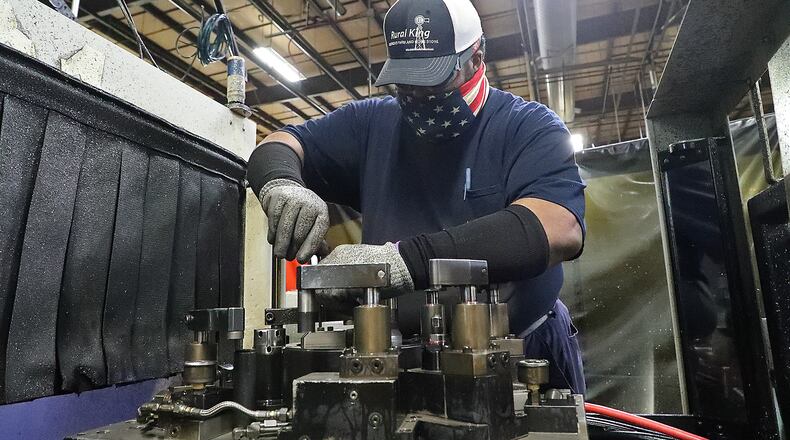Trump’s campaign event at the Dayton International Airport in September billed as “Fighting for the American Worker” demonstrates how central manufacturing remains to the presidential election. The industry provides about 10% of jobs in the Dayton, Springfield and Cincinnati-Middletown regions.
Analysis of data from the U.S. Bureau of Labor Statistics shows that both Obama and Trump have had net manufacturing job losses under their administrations. However, Richard Stock, director of the University of Dayton Business Research Center, points out that it is more appropriate to compare the two administrations by excluding the recession President Barack Obama inherited and the recent recession caused by the coronavirus during Trump’s term.
Since about 2010, through March of this year, the number of manufacturing jobs has risen steadily in the U.S., Ohio and local cities at nearly the same rate under both administrations.
“From my point of view, their records with respect to manufacturing employment growth would have to be real similar,” Stock said.
What are the candidates plans for manufacturing?
Neither candidate’s plan would have a large impact on the manufacturing industry, Stock believes.
Both candidates plan to spend a massive amount of money on infrastructure next term, which would benefit manufacturing somewhat, Stock said.
Biden’s plan for manufacturing calls for a penalty tax on foreign earnings and a tax credit for businesses that bring back manufacturing jobs by revitalizing a closed factory or retooling an existing one, according to Biden’s Ohio campaign office.
Trump’s plan calls for a tax credit for companies that bring back jobs from China and tax deductions for industries like pharmaceuticals and robotics that bring manufacturing jobs back to the U.S. He has also pledged no federal contracts for companies who outsource to China.
Stock assumes Trump would continue to deploy tariffs in a second term, based on Trump’s repeated touting of his tariffs on foreign goods and criticism of Biden as soft on China.
Stock explained that tariffs and other more direct actions proposed by the candidates to penalize manufacturing abroad “wind up being a wash” in regards to creating manufacturing jobs.
“Manufacturing today in the United States is part of a global supply chain where factories in the United States manufacturing are buying parts from all over the globe,” Stock said. “They are themselves often suppliers to some other international manufacturer doing final assembly in some other country. So tariffs wind up being a blunt instrument in the sense that they wind up raising prices for particular manufacturers in the United States, while lowering prices for other manufacturers in the United States.”
Stock believes it comes down to the candidates' overall fiscal policies. While Trump plans to extend his tax cuts for wealthy Americans, Biden plans to reverse those tax cuts.
“So the real question is whether that money is held in the hands of the top 1% will lead to greater manufacturing employment growth than it would if it is taxed away from them and it gets used on a variety of programs that the government would start to institute,” Stock said. “Putting money into the hands of lower middle income or middle income people, which is a lot of what is being proposed under the Biden administration plans, probably winds up helping durable goods industries in the United States.”
What do local manufacturers want?
Local manufacturers that spoke to the Springfield News-Sun stated that they wanted to see the next president focus on recovering from the coronavirus pandemic as well as workforce development.
The World Health Organization declared COVID-19 a global pandemic on March 11. Later in the month a statewide stay-at-home order was enacted in Ohio. It called for businesses not deemed essential to temporarily close their doors.
Most manufacturers in Clark County were deemed essential and remained operational. However, some have experienced production shortfalls, lay offs and supply chain issues caused by the pandemic.
Pentaflex in Springfield, which makes safety parts for the heavy truck market, has seen a revenue drop of about 35% so far this year when compared to the same period in 2019.
That resulted in layoffs for the company in May and June that impacted over 30 employees. However the company’s suppliers have began ramping up their production.
That has resulted in the projection that Pentaflex’s revenue for its fourth quarter this fiscal year will be relatively stable, said Ross McGregor, the company’s president.
He said they have brought back some employees who were previously laid off, but are not back at full strength just yet.
McGregor said the company is anticipating a need for more workers in early 2021.
“We need to have a coordinated effort regarding the coronavirus pandemic and put the country on that path in order to move forward,” McGregor said
He said that includes finding a vaccine quickly, following the proper steps, and learning to live with the virus in a safe manner. He said that Pentaflex has altered its operations like most companies in order to comply with state guidelines amid the pandemic.
Jim Zahora, the CEO of TAC Industries — a nonprofit that provides training and jobs to those with disabilities— said that recovery from the coronavirus as well as implementing plans based on lessons learned from the pandemic would be important moving forward.
“We need to really take a hard look at our supply chains. We need to make sure that we are not to reliant on other countries, such as China,” Zahora said.
His nonprofit has contracts with several Clark County manufacturers as well as with the federal government to produce cargo nets for the U.S. Air Force.
The nonprofit serviced about 180 people in its vocational program before the pandemic. However, that number has dropped to a little over 50 people due to state guidelines implemented as a result of the pandemic.
Staff members have filled in to provide labor needed to keep up with production, Zahora said. He said early on in the pandemic the nonprofit had some supply chain issues. However, those issues were resolved, he saida.
Both Zahora and McGregor said that preexisting workforce development issues continue to be a problem. They both noted an improvement is needed in the talent pipeline for manufacturers as they are having trouble replacing skilled workers who are retiring.
Every year the Dayton Region Manufacturers Association, which has members in Clark County, surveys its members about their top concerns. The pandemic hasn’t dramatically upended those concerns, said Angelia Erbaugh, association president.
Companies remain concerned about finding the right workers, covering their health care and getting their products to customers in a nation where infrastructure continues to age.
“The top of the list is always the shortage of skilled workers,”' she said. "DRMA members support initiatives that attract, retain, develop and train a workforce.”
In international trade, DRMA members want a “level playing field,” she said, “with as little volatility as possible.”
McGregor said another priority for the president should be to reestablish good trade relationships.
Every local race, every local issue
The Springfield News-Sun is the only place for complete local election coverage. Go to SpringfieldNewsSun.com/elections for more stories.



